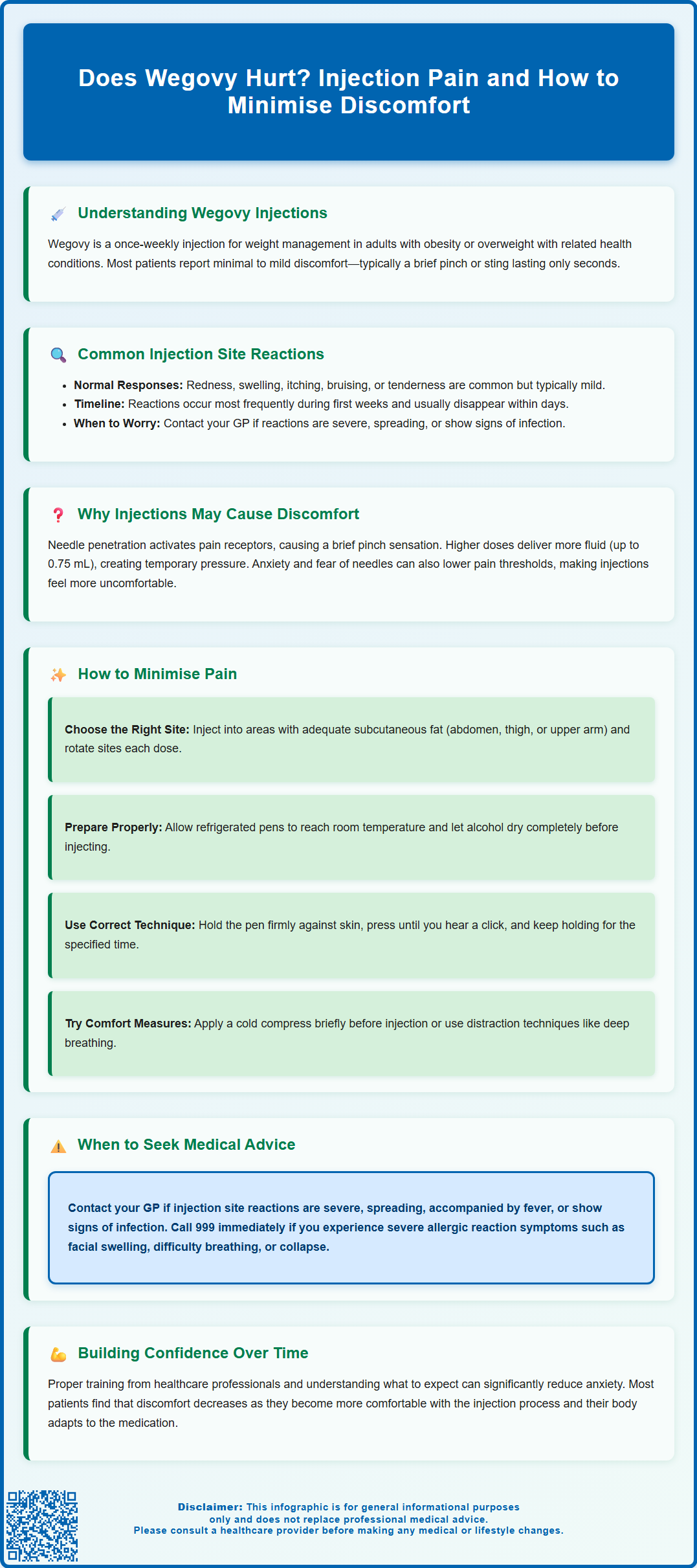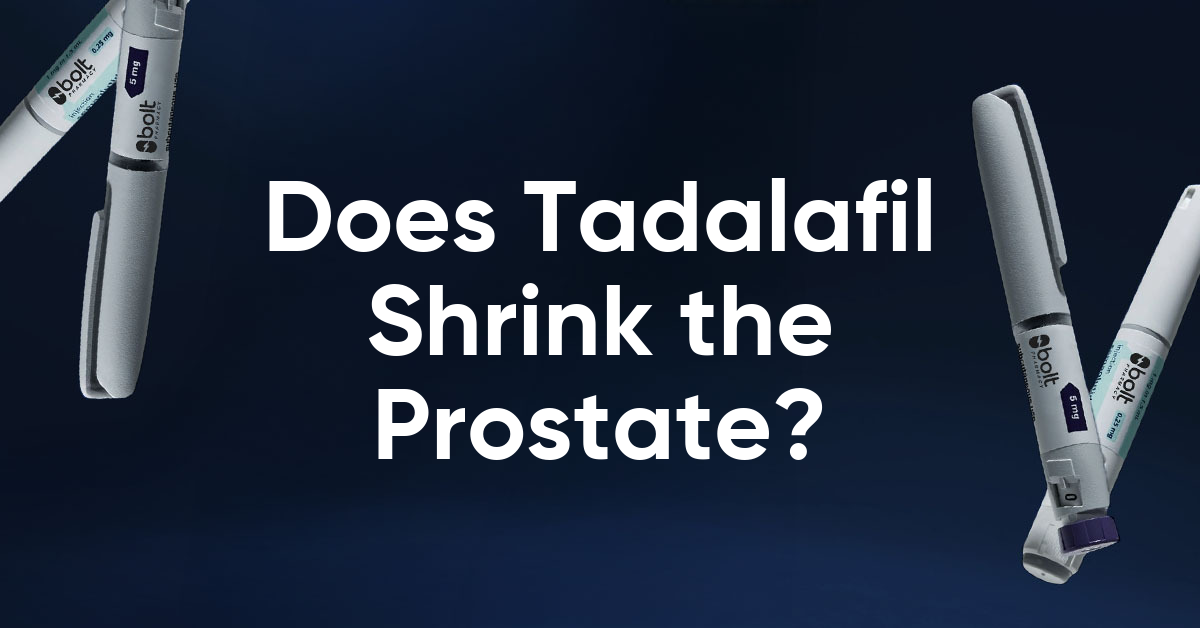Does Wegovy hurt? This is one of the most common questions from patients considering this once-weekly injection for weight management. Wegovy (semaglutide 2.4 mg) is a GLP-1 receptor agonist licensed in the UK for adults with obesity or overweight with weight-related conditions, used alongside diet and exercise. Most patients report minimal to mild discomfort during injection—typically a brief pinch or sting lasting seconds. The pre-filled pen device is designed to minimise pain, though individual experiences vary based on injection technique, site selection, and personal pain sensitivity. Understanding what to expect and how to inject properly can significantly reduce discomfort and improve treatment adherence.
Summary: Wegovy injections typically cause minimal to mild discomfort, described as a brief pinch or sting lasting only seconds, with most patients finding the injection manageable.
- Wegovy is a once-weekly subcutaneous GLP-1 receptor agonist injection licensed in the UK for weight management in adults with obesity or overweight with comorbidities.
- Common injection site reactions include redness, swelling, itching, bruising, tenderness, and small nodules, which are usually mild and resolve within days.
- Discomfort arises from needle penetration, solution volume (0.5–0.75 mL), tissue irritation, injection technique, and psychological factors such as needle anxiety.
- Proper technique—including site rotation (abdomen, thigh, upper arm), allowing alcohol to dry, and following pen instructions—significantly reduces pain and injection site reactions.
- Patients should contact their GP if reactions are severe, spreading, or show signs of infection; call 999 for severe allergic reactions such as facial swelling or breathing difficulty.
Table of Contents
Understanding Wegovy Injections and Pain
Wegovy (semaglutide 2.4 mg) is a once-weekly subcutaneous injection licensed in the UK for weight management in adults with obesity (BMI ≥30 kg/m²) or overweight (BMI ≥27 kg/m²) with weight-related comorbidities. It should be used alongside a reduced-calorie diet and increased physical activity. As a glucagon-like peptide-1 (GLP-1) receptor agonist, it works by mimicking the action of the naturally occurring GLP-1 hormone, which regulates appetite and food intake. Whilst Wegovy has demonstrated significant efficacy in clinical trials, many patients understandably have concerns about injection-related discomfort before starting treatment.
The question of whether Wegovy hurts is common among prospective users, and the answer varies considerably between individuals. Most patients report that the injection itself causes minimal to mild discomfort, often described as a brief pinch or sting lasting only seconds. Wegovy comes as a single-dose, pre-filled pen device designed to minimise pain during administration. However, some people may experience more noticeable discomfort depending on injection technique, site selection, and individual pain sensitivity.
It is important to distinguish between the momentary sensation of the injection and subsequent injection site reactions, which may develop in the hours following administration. Pain perception is highly subjective, and factors such as anxiety about self-injection, previous experiences with needles, and proper training in injection technique all influence the overall experience. Healthcare professionals should provide comprehensive training and reassurance to patients initiating Wegovy, emphasising that most users quickly become comfortable with the injection process. Understanding what to expect can significantly reduce anxiety and improve treatment adherence throughout the weight management journey.
Common Injection Site Reactions
Injection site reactions are among the most frequently reported adverse effects associated with Wegovy, though they are typically mild and transient. According to clinical trial data, these reactions occur in a notable proportion of patients, particularly during the initial weeks of treatment. The most common injection site symptoms include:
-
Redness (erythema) – localised pink or red discolouration at the injection site
-
Swelling – mild puffiness or raised area around the injection point
-
Itching (pruritus) – temporary irritation causing an urge to scratch
-
Bruising (ecchymosis) – small purple or blue marks from minor bleeding under the skin
-
Tenderness – sensitivity or soreness when touching the injection area
-
Nodules or lumps – small, firm areas that may persist for several days
These reactions generally appear within hours of injection and resolve spontaneously within a few days without requiring medical intervention. The incidence tends to decrease as patients continue treatment, suggesting that local tissue tolerance may improve over time. Most patients find these reactions manageable and not severe enough to stop treatment.
It is worth noting that injection site reactions do not indicate an allergic response in most cases; rather, they represent normal inflammatory responses to the subcutaneous administration of medication. However, patients should be advised to contact their GP or prescriber if reactions are severe, spreading, accompanied by systemic symptoms (fever, malaise), or show signs of infection such as increasing warmth, pus, or red streaking from the injection site. If you experience signs of a severe allergic reaction such as swelling of the face, lips, tongue, difficulty breathing, or collapse, call 999 immediately. Patients can report any suspected side effects via the MHRA Yellow Card scheme at yellowcard.mhra.gov.uk or through the Yellow Card app.

Why Wegovy Injections May Cause Discomfort
Several physiological and technical factors contribute to the discomfort some patients experience with Wegovy injections. Understanding these mechanisms can help both healthcare professionals and patients implement strategies to minimise pain and improve the injection experience.
Needle penetration and tissue trauma represent the most immediate source of discomfort. When the pen's needle penetrates the epidermis and dermis to reach the subcutaneous tissue layer, it activates nociceptors (pain receptors) in the skin, creating the characteristic pinch or sting sensation. Individual variation in skin thickness, nerve density, and pain threshold explains why some patients find injections more uncomfortable than others.
The volume of the solution also influences injection comfort. Wegovy pens deliver either 0.5 mL (for 0.25 mg, 0.5 mg, and 1.0 mg doses) or 0.75 mL (for 1.7 mg and 2.4 mg doses) of solution into the subcutaneous space. This fluid must disperse through the tissue, which can create a sensation of pressure or fullness, particularly at higher doses. The formulation may cause temporary irritation to surrounding tissues, contributing to post-injection tenderness.
Injection technique significantly impacts pain perception. Injecting into areas with less subcutaneous fat or reusing injection sites too frequently can increase discomfort. Tense muscles during injection may also heighten pain sensation. Additionally, incorrect administration (such as injecting into a vein or muscle rather than subcutaneous tissue) can cause more pain than proper administration.
Psychological factors should not be underestimated. Anxiety and anticipation of pain can lower pain thresholds through stress-mediated mechanisms, creating a self-fulfilling cycle where fear of injection increases actual pain perception. This is particularly relevant for patients with needle phobia or limited experience with self-injection.
How to Minimise Pain When Using Wegovy
Implementing evidence-based injection techniques and practical strategies can substantially reduce discomfort associated with Wegovy administration. Healthcare professionals should provide thorough training and written guidance to support patients in developing confidence with self-injection.
Preparation and injection site selection are fundamental to minimising pain. Wegovy should be injected into areas with adequate subcutaneous tissue: the abdomen (avoiding a 5cm radius around the navel), thigh, or upper arm (upper arm injections are usually administered by another person). Rotating injection sites with each dose prevents tissue damage and local skin changes. Patients should maintain a record of injection locations to ensure systematic rotation. Follow the storage instructions in the Patient Information Leaflet; if the pen has been refrigerated, allow it to reach room temperature before use according to the instructions provided.
For optimal injection technique, follow the specific steps in the Wegovy Instructions for Use, which include:
-
Cleanse the injection site with an alcohol wipe and allow it to dry completely – wet alcohol stings when the needle penetrates
-
Follow the pen device instructions exactly for removing the cap and administering the injection
-
Hold the pen firmly against the skin at the injection site as directed in the Instructions for Use
-
Press and hold the button until you hear or feel a click, then continue holding the pen against your skin for the time specified in the Instructions for Use
-
Apply gentle pressure with a clean cotton wool ball if needed, but avoid rubbing the site
-
Do not inject into areas that are tender, bruised, red, hard, scarred, or have stretch marks
-
Do not inject into a vein or muscle
Some patients find that applying a cold compress to the injection site for a short time before injection may provide temporary numbing, though this is optional. Distraction techniques such as deep breathing or focusing on something else during the injection may also help reduce anxiety and perceived pain.
Patients experiencing persistent or worsening injection site reactions should consult their prescriber, as alternative GLP-1 receptor agonists or formulations may be considered. However, with proper technique and time, most individuals find that Wegovy injections become a manageable part of their weekly routine with minimal discomfort.
Frequently Asked Questions
How painful is a Wegovy injection?
Most patients report minimal to mild discomfort, typically described as a brief pinch or sting lasting only seconds. Pain perception varies between individuals based on injection technique, site selection, and personal pain sensitivity.
What are the most common side effects at the Wegovy injection site?
Common injection site reactions include redness, swelling, itching, bruising, tenderness, and small nodules. These are usually mild, appear within hours of injection, and resolve spontaneously within a few days without medical intervention.
How can I reduce pain when injecting Wegovy?
To minimise pain, rotate injection sites (abdomen, thigh, upper arm), allow alcohol wipes to dry completely before injecting, let refrigerated pens reach room temperature as instructed, and follow the pen device instructions precisely. Avoid injecting into tender, bruised, or scarred areas.
The health-related content published on this site is based on credible scientific sources and is periodically reviewed to ensure accuracy and relevance. Although we aim to reflect the most current medical knowledge, the material is meant for general education and awareness only.
The information on this site is not a substitute for professional medical advice. For any health concerns, please speak with a qualified medical professional. By using this information, you acknowledge responsibility for any decisions made and understand we are not liable for any consequences that may result.
Heading 1
Heading 2
Heading 3
Heading 4
Heading 5
Heading 6
Lorem ipsum dolor sit amet, consectetur adipiscing elit, sed do eiusmod tempor incididunt ut labore et dolore magna aliqua. Ut enim ad minim veniam, quis nostrud exercitation ullamco laboris nisi ut aliquip ex ea commodo consequat. Duis aute irure dolor in reprehenderit in voluptate velit esse cillum dolore eu fugiat nulla pariatur.
Block quote
Ordered list
- Item 1
- Item 2
- Item 3
Unordered list
- Item A
- Item B
- Item C
Bold text
Emphasis
Superscript
Subscript










